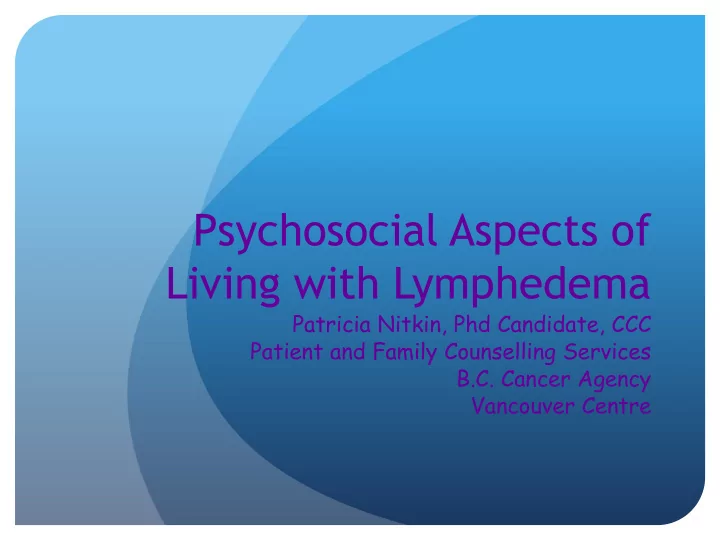

Psychosocial Aspects of Living with Lymphedema Patricia Nitkin, Phd Candidate, CCC Patient and Family Counselling Services B.C. Cancer Agency Vancouver Centre
Three Kinds of Stories Restitution story – being ill as a process of finding restitution…restored Chaos story – overwhelmed, the story swirls around you Quest story – transformation, new meanings Arthur Frank, Univ of Calgary
COMMON DIFFICULTIES & FEARS Depression Multiple losses Family and relationship Loss of self image issues Dependency Symptom management Progression of illness Exhaustion: emotional, physical, spiritual.. Pain Anxiety/stress management Change in roles/ lifestyle Sexuality and intimacy issues Emotions Finances and Vocational challenges
COPING AND ADAPTATION COPING is what one does about a perceived problem in order to bring about relief, reward, quiescence or equilibrium. (Weisman & Worden (1977) Values and beliefs affect coping. ADAPTATION begins when a person manages to incorporate illness into their daily lives and effectively address problems or concerns created by the illness.
Factors which effect Coping with a Chronic Condition Previous experience Support network Severity of symptoms Stage of life/family life cycle Beliefs/values Personality Role in the family Coping resources Other issues present/unresolved
BIOPSYCHOSOCIAL APPROACH Underlying Assumptions Nothing that we do is purely psychological Everything that we do causes biochemical changes We are biophysiological beings – fight or flight principle Systems driven Cross cultural differences Setting goals/therapeutic plan
Key Issues Facing Patients and Families / Friends Will anything be normal again?. “I want the old me back..” Relationship changes (spousal, family, friends, colleagues) Existential (meaning) of life issues Multiple losses: physical,practical, intangible Guilt
Depression Some mood changes are to be expected Losses and changes are real How do you know when you may need help? Symptoms remain for an extended period Functionality decreases and does not return Thoughts of ending one’s life Depression is very common for individuals dealing with chronic conditions There is no shame in this See your doctor
WHAT HELPS Stress management ~ Relaxation techniques Education Practical assistance Respecting your abilities and your limits Support Counselling / Group support Making Meaning Compassion toward self and others Community Focus on the here and now
Support
Types of Support Emotional Practical Informational Companion
Family Systems Family is an emotional system Individuals and families are shaped by family stories Significant change in an individual influences system Reactivity and anxiety Tension between forces of individuality and togetherness Times of transition New responsibilities/roles/boundaries Periods of upheaval and confusion Balance seeking Family life cycle
Healthy Coping Strategies Gather information/problem solve Adapt and adjust ★ Seek support Express feelings Seek beauty and joy in nature, music, art ♫ Reduce stress Individual/family counselling / Group support Trust in self
ABC Affect Behaviour Cognition A change in one component of thoughts, feelings and behaviors will affect other components
Challenges to Coping Depression Poorly managed pain Lack of knowledge about disease Knowing the difference between ‘healing’ & ‘curing’ Overwhelm Lack of support Additional losses
Counselling Interventions Patient/Family centred Dependent on patient identified needs/areas (motivation) Based on theoretical frameworks and practice knowledge Individual, couple, family, group based Wellness in every aspect of the word - yoga, meditation, moderate exercise, balanced diet, adequate rest People can begin to gain experience and to redefine all aspects of their lives
Therapeutic Approaches Cognitive-behavioral Supportive expressive Stress reduction strategies Creative therapies Distraction Psychoeducational Cognitive And others restructuring Positive self-talk Guided imagery Problem solving
References and Other resources References MacKenzie, G. (2006); Sample, S. (2008); MSW Psychosocial Oncology course Resources BC Cancer Agency website www.bccancer.bc.ca/coping with cancer Video – Living with Cancer – Emotional Perspectives The Intelligent Patient Guide to Breast Cancer – Olivotto, Gelmon, McCready, Prittchard, Kuusk Full Catastrophe Living- Jon Kabat-Zinn
Recommend
More recommend